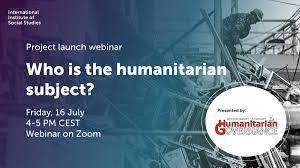
Growing humanitarian need, increasing population displacement and expanding climate-related disasters multiply the challenges of preserving life and dignity in crisis-affected populations.
At-risk populations are increasingly difficult to capture using the traditional categories of disaster/conflict victims and refugees, and one of the major questions is: Who is the humanitarian subject?
Speakers
- Professor Dorothea Hilhorst - Professor of humanitarian studies at the International Institute of Social Studies of Erasmus University and project coordinator
- Dr Hugo Slim - Senior Research Fellow at the Institute of Ethics, Law and Armed Conflict (ELAC) at the Blavatnik School of Government
- Dr Juan Ricardo Aparicio Cuervo - Associate Professor at Universidad de los Andes, Colombia. Colombia node research partner
The webinar will be chaired by Professor Arjun Bedi, Deputy Rector research at the International Institute of Social Studies.
Humanitarian governance: accountability, advocacy, alternatives
- How do accountability and advocacy processes of aid recipients and civil society actors alter governance relations ‘from below’?
- How do different patterns of governance emerge in different types of crisis and contexts of state-society-aid relations?

The Humanitarian Governance (HUM-GOV) project is financed by a European Research Council (ERC) advanced grant and has a special focus on how civil society actors and crisis-affected people shape humanitarian governance by using accountability and advocacy.
Additionally, the project seeks to develop models of alternative humanitarian ethics, for example centering on solidarity in addition to humanitarian principles.
Finally, there is a component researching how humanitarian actors conceptualize and deal with climate-related displacement. HUM-GOV works with partner institutes in Colombia, Ethiopia and the Democratic Republic of Congo (DRC), where case studies take place. The project runs from 2021-2025.
An important secondary objective is to re-asses humanitarian studies by expanding the spaces and strategies that have opened up for reform ‘from below’ in the rapidly changing, risky and unstable contexts of humanitarian crises
Shaping future
humanitarian and ethical research
By focusing on the viewpoints and influence of affected communities and
civil society actors, the HUM-GOV project will contribute to the way humanitarian
governance is seen and understood. It will also shape future humanitarian and
ethical research exploring the boundaries of participatory research in conflict-
affected and politically volatile areas, by promoting more equal research partnership.
Why is this research relevant?
The numbers of people worldwide whose lives are endangered and that are rendered destitute by conflict, disaster or political collapse is growing, as well as the numbers of people that become displaced from their home communities. This is partly in relation to climate change.
Changes in humanitarian governance
Humanitarian governance has been rapidly changing over the last decade. The international character of humanitarian action is shifting to recognize and advance the multiple roles of local state and non-state actors. The logic of humanitarian action is becoming more diverse and shifts from a single focus on the humanitarian principles to alternative practices organized around, for example, resilience, accountability or solidarity.
We also expect to see that aid recipients gain more voice to challenge governance through accountability and advocacy practices. Finally, humanitarian actors find it increasingly difficult to define the scope of their actions and identify who is, and who is not, eligible for humanitarian assistance. The latter gains in importance as projections on disasters and displacement in relation to climate change concern ever larger numbers of affected people.
The HUM-GOV research is a timely project to analyze these ongoing changes and to amplify the voices and influence of crisis-affected populations in humanitarian governance.
People-centred sustainable development
Crisis-affected areas are often in the lowest ranks of the Sustainable Development Goals and hence we see increasing effort from the whole international community, including the United Nations, to promote service delivery and development in these contexts.
The project studies these trends from a lens of social justice and accountability and hence may contribute to make humanitarian action and service delivery more people-centred, and better aligned with sustainable development.
Collaborations
The project team is led by Professor Dorothea Hilhorst and Assistant Professor Rodrigo Mena. Partners include institutes in Colombia, Ethiopia and the DRC and 5 PhD candidates.










Add new comment